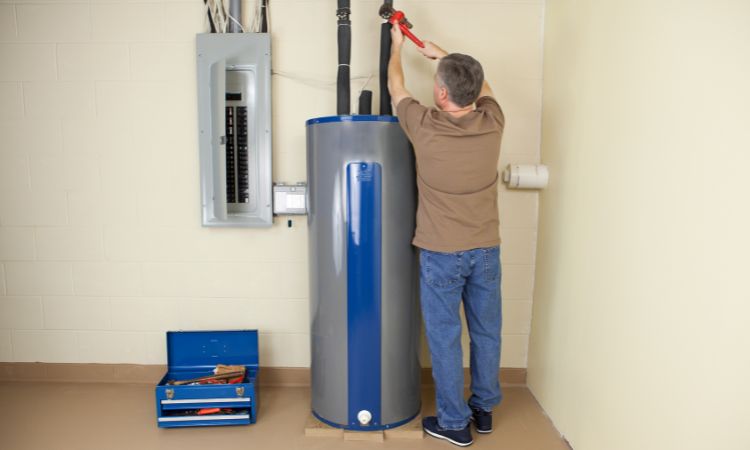Comprehending The Heater's Challenges
Comprehending The Heater's Challenges
Blog Article
This article in the next paragraphs on the subject of Common Problems with Tank Water Heaters is definitely fascinating. Don't miss out on it.

Think of beginning your day without your routine warm shower. That already sets a bad tone for the rest of your day.
Every residence requires a reliable hot water heater, however just a few recognize how to take care of one. One easy method to maintain your hot water heater in leading shape is to check for mistakes consistently and fix them as quickly as they show up.
Keep in mind to shut off your water heater prior to smelling around for faults. These are the water heater mistakes you are more than likely to encounter.
Water too warm or too chilly
Every hot water heater has a thermostat that figures out exactly how hot the water obtains. If the water entering into your residence is too hot despite establishing a hassle-free optimum temperature level, your thermostat could be malfunctioning.
On the other hand, too cold water may be because of a stopped working thermostat, a broken circuit, or improper gas circulation. For example, if you make use of a gas hot water heater with a broken pilot burner, you would obtain cold water, even if the thermostat is in excellent condition. For electric heating units, a blown fuse might be the wrongdoer.
Insufficient hot water
Hot water heater come in several sizes, depending on your hot water demands. If you run out of warm water before everybody has actually had a bath, your hot water heater is also small for your family size. You ought to think about installing a bigger water heater container or going with a tankless water heater, which takes up much less area and also is a lot more resilient.
Weird sounds
There are at the very least 5 kinds of noises you can speak with a hot water heater, however the most typical analysis is that it's time for the water heater to retire.
To start with, you ought to know with the typical sounds a water heater makes. An electric heating system may appear different from a gas-powered one.
Standing out or banging sounds normally suggest there is a slab of sediment in your containers, and it's time to cleanse it out. On the other hand, whistling or hissing noises might simply be your valves letting some pressure off.
Water leakages
Leakages could originate from pipes, water links, valves, or in the worst-case scenario, the storage tank itself. With time, water will certainly corrode the tank, and also locate its way out. If this happens, you need to replace your water heater asap.
Nonetheless, before your modification your entire container, be sure that all pipes are in location and that each valve functions completely. If you still need aid determining a leakage, call your plumber.
Rust-colored water
Rust-colored water indicates one of your hot water heater components is worn away. It could be the anode rod, or the storage tank itself. Your plumber will have the ability to identify which it is.
Lukewarm water
Regardless of how high you set the thermostat, you won't obtain any kind of hot water out of a heating unit well past its prime. A water heater's efficiency might minimize with time.
You will certainly likewise get warm water if your pipelines have a cross connection. This indicates that when you activate a faucet, hot water from the heater flows in along with regular, cold water. A cross link is very easy to area. If your warm water taps still follow shutting the water heater shutoffs, you have a cross link.
Discoloured Water
Rust is a major cause of dirty or discoloured water. Corrosion within the water container or a falling short anode rod can cause this discolouration. The anode pole safeguards the container from rusting on the within and must be checked annual. Without a pole or a properly working anode pole, the hot water rapidly rusts inside the container. Get in touch with a professional water heater professional to identify if changing the anode pole will certainly take care of the problem; otherwise, replace your hot water heater.
Verdict
Ideally, your water heater can last one decade prior to you require an adjustment. Nonetheless, after the 10-year mark, you may experience any of these mistakes extra routinely. At this point, you need to include a brand-new water heater to your budget.
How To Troubleshoot 3 Common Water Heater Problems in Twin Cities
The Water Heater Is Leaking
A leaky cold water inlet valve A loose pipe fitting A leaky temperature and pressure relief valve A corroded anode rod A cracked tank Turn Off Your Water Heater:
Shut off your gas water heater by turning the gas valve on the unit to the “OFF” position. Shut off your electric water by switching its power off at your electrical panel. Look for a two-pole breaker labeled “water heater” and turn it to the “OFF” position. Move the ball valve connected to the water heater to be perpendicular to the piping at a 90° angle. Look for the Leak:
Depending on whether the water is coming from the tank's top or bottom, you’ll want to look for the leak in different locations.
If the leak comes from the top of the tank, carefully look for water escaping from the cold water inlet valve or loose pipe fittings. Rusted hot and cold water valves can have loose connections with the tank, with water leaking out of them.
https://mspplumbingheatingair.com/blog/how-to-troubleshoot-3-common-water-heater-problems
I was brought to that editorial about Water Heater Repair and Troubleshooting through a good friend on our other domain. Sharing is good. Helping others is fun. I praise you for your time. Visit us again soon.
Quick relief? Dial! Report this page